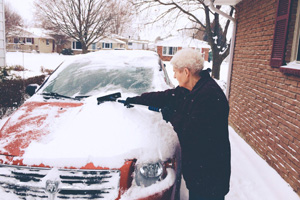Piles of frosted snowflakes can be one of the most beautiful and anticipated images that come to mind when pondering the winter months; but when those snowflakes pile up, and the season’s coldness sets in, many safety issues arise.
For senior citizens, who may already be in a fragile condition as falls become more probable, safety concerns tend to multiply. A house’s pipes may freeze, and pantries and medications must stay well stocked in case of an unexpected blizzard. Keeping one’s home and surroundings secure during the winter becomes a real priority.
For those living at home, be sure to check your carbon monoxide and smoke detectors. Check that the batteries are replaced and test them by using the test button. If you have a space heater, make sure the area around it is clear and turn it off before leaving the room or going to bed.
“Sometimes, people may want to use their stove to heat the house but you should never do that because it is very dangerous,” added Rosenberg. “If using a fireplace, call an inspector to check the chimney and flue and make sure the flue is open before using it.”
Keep your home stocked with a winter supply kit filled with the following items:
- At least a three-day supply of water (one gallon per person per day)
- At least a three-day supply of non-perishable, easy-to-prepare food
- First Aid kit
- Flashlight
- Extra batteries
- Extra cash on hand
- Battery-powered or hand-crank radio
- A week’s supply of medication and medical items such as hearing aids with extra batteries, glasses, syringes, contact lenses, etc.
- Sanitation and personal hygiene items
- Cell phone with chargers
- A detailed list of family and emergency contact information
- Tools and supplies to secure your home
- Pet supplies
- Copies of personal documents (medication list and pertinent medical information, proof of address, deed/lease to home, passports, birth certificates, insurance policies)
- Sand, rock salt or non-clumping kitty litter to make walkways and steps less slippery
- Winter weather accessories such as coats, gloves, mittens, hats, boots, warm clothing and blankets.
- Ample alternate heating methods such as fireplaces or wood- or coal-burning stoves
To prevent water pipes in the home from freezing, drain water from swimming pool and water sprinkler supply lines following manufacturer’s or installer’s directions. Do not put antifreeze in these lines unless directed, as it is dangerous to humans, pets, wildlife, and landscaping. Next, remove, drain, and store outdoor hoses. Close inside valves supplying outdoor hose bibs and open the outside hose bibs to allow water to drain. Keep the outside valve open so that any water remaining in the pipe can expand without causing the pipe to break.
Check around the home for other areas where water supply lines are located in unheated areas. The hot and cold water pipes should be insulated with products such as a pipe sleeve or UL-listed heat tape, heat cable or similar materials on exposed water pipes. Consider using newspaper to insulate and protect exposed pipes.
Before going outside, always check the weather forecast first. If it if is very cold, make sure you wear layers and have a good coat, thick socks, hat, gloves, boots and scarf. Be aware that seniors can get frostbite quickly, so it is advised to not stay outside for too long, especially if it is windy.
Car safety is equally important, reports Rosenberg, who advises that seniors also check the weather forecast before driving. He suggest staying off the roads in severe weather or when the roads could be icy. Keep an emergency kit, a warm blanket, a car charger and kitty litter in the car. If you have a mechanic or dealership you trust, make sure they check tires, wipers and antifreeze. Winterize your vehicle and keep the gas tank full to prevent the fuel line from freezing.
Take preventative action during cold months with the following tips:
- Install storm windows or cover windows with plastic from the inside to keep cold air out.
- Maintain heating equipment and chimneys by having them cleaned and inspected every year.
- If you will be going away during cold weather, leave the heat on in your home, set to a temperature no lower than 55° F.
- Keep garage doors closed if there are water supply lines in the garage.
- Circulate warmer air around the plumbing by opening kitchen and bathroom cabinet doors.
- Let cold water drip from the faucet served by exposed pipes. Running water through the pipe – even at a trickle – helps prevent pipes from freezing.
- Keep the thermostat set to the same temperature both during the day and at night. By temporarily suspending the use of lower nighttime temperatures, you may incur a higher heating bill, but you can prevent a much more costly repair job if pipes freeze and burst.
The Oscar and Ella Wilf Campus for Senior Living is comprised of Stein Assisted Living, Jaffa Gate Memory Care Neighborhood, Stein Hospice, Wilentz Senior Residence, Wilf Transport, and The Foundation at the Wilf Campus. For more information, contact us at (732) 568-1155, [email protected] or visit us at www.wilfcampus.org.

